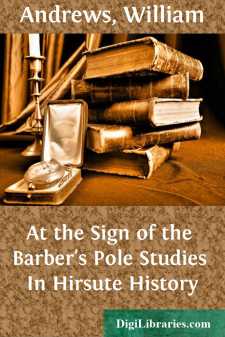Categories
- Antiques & Collectibles 13
- Architecture 36
- Art 48
- Bibles 22
- Biography & Autobiography 813
- Body, Mind & Spirit 142
- Business & Economics 28
- Children's Books 17
- Children's Fiction 14
- Computers 4
- Cooking 94
- Crafts & Hobbies 4
- Drama 346
- Education 46
- Family & Relationships 57
- Fiction 11829
- Games 19
- Gardening 17
- Health & Fitness 34
- History 1377
- House & Home 1
- Humor 147
- Juvenile Fiction 1873
- Juvenile Nonfiction 202
- Language Arts & Disciplines 88
- Law 16
- Literary Collections 686
- Literary Criticism 179
- Mathematics 13
- Medical 41
- Music 40
- Nature 179
- Non-Classifiable 1768
- Performing Arts 7
- Periodicals 1453
- Philosophy 64
- Photography 2
- Poetry 896
- Political Science 203
- Psychology 42
- Reference 154
- Religion 513
- Science 126
- Self-Help 84
- Social Science 81
- Sports & Recreation 34
- Study Aids 3
- Technology & Engineering 59
- Transportation 23
- Travel 463
- True Crime 29
Bygone Punishments
by: William Andrews
Categories:
Description:
Excerpt
Hanging.
he usual mode of capital punishment in England for many centuries has been, and still is, hanging. Other means of execution have been exercised, but none have been so general as death at the hands of the hangman. In the Middle Ages every town, abbey, and nearly all the more important manorial lords had the right of hanging, and the gallows was to be seen almost everywhere.
Representatives of the church often possessed rights in respect to the gallows and its victims. William the Conqueror invested the Abbot of Battle Abbey with authority to save the life of any malefactor he might find about to be executed, and whose life he wished to spare. In the days of Edward I. the Abbot of Peterborough set up a[2] gallows at Collingham, Nottinghamshire, and hanged thereon a thief. This proceeding came under the notice of the Bishop of Lincoln, who, with considerable warmth of temper, declared the Abbot had usurped his rights, since he held from the king's predecessors the liberty of the Wapentake of Collingham and the right of executing criminals. The Abbot declared that Henry III. had given him and his successors "Infangthefe and Utfangthefe in all his hundreds and demesnes." After investigation it was decided that the Abbot was in the wrong, and he was directed to take down the gallows he had erected. One, and perhaps the chief reason of the prelate being so particular to retain his privileges was on account of its entitling him to the chattels of the condemned man.
Little regard was paid for human life in the reign of Edward I. In the year 1279, not fewer than two hundred and eighty Jews were hanged for clipping coin, a crime which has brought many to the gallows. The following historic story shows how slight an offence led to death in this monarch's time. In 1285, at the solicitation of Quivil, the Bishop of Exeter, Edward I. visited Exeter to enquire into the circumstances relating[3] to the assassination of Walter Lichdale, a precentor of the cathedral, who had been killed one day when returning from matins. The murderer made his escape during the night and could not be found. The Mayor, Alfred Dunport, who had held the office on eight occasions, and the porter of the Southgate, were both tried and found guilty of a neglect of duty in omitting to fasten the town gate, by which means the murderer escaped from the hands of justice. Both men were condemned to death, and afterwards executed. The unfortunate mayor and porter had not anything to do with the death of the precentor, their only crime being that of not closing the city gate at night, a truly hard fate for neglect of duty.
A hanging reign was that of Henry VIII. It extended over thirty-seven years, and during that period it is recorded by Stow that 72,000 criminals were executed.
In bygone times were observed some curious ordinances for the conduct of the Court of Admiralty of the Humber. Enumerated are the various offences of a maritime character, and their punishment. In view of the character of the court, the punishment was generally to be inflicted at low-water mark, so as to be within the proper[4] jurisdiction of the Admiralty, the chief officer of which, the Admiral of the Humber, being from the year 1451, the Mayor of Hull....



